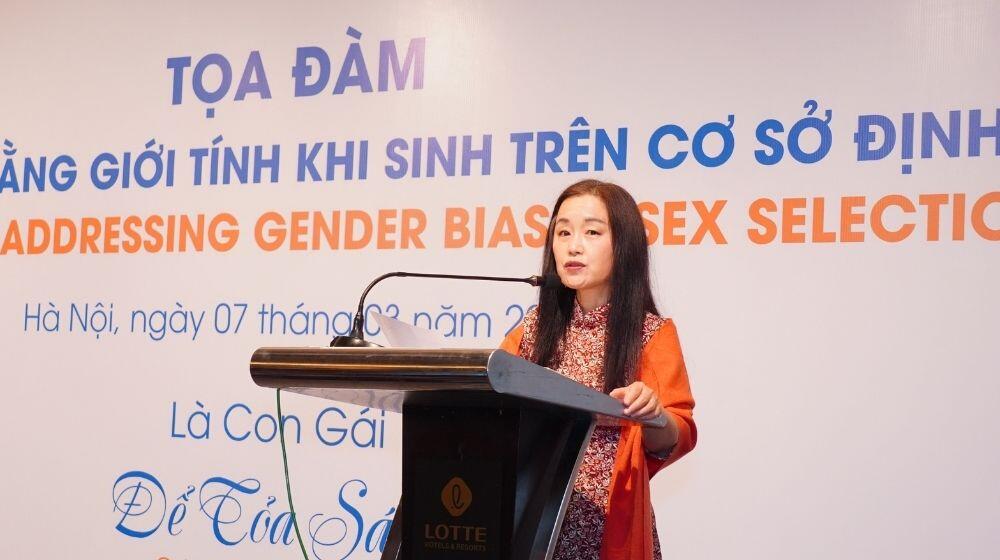Excellency Grete Lochen, Ambassador of Norway to Viet Nam;
Mr. Nguyen Doan Tu, General Director of GOPFP, Ministry of Health;
Representatives from MOLISA, MOH, Viet Nam Farmer’s Union, Viet Nam Youth Union and CSAGA;
UN colleagues and media;
Online participants, including my colleague Ms. Upala Devi, Regional Technical Adviser for Gender at the UNFPA regional office in Bangkok; and participants from Quang Ninh, Bac Giang, Hung Yen, Nghe An, Vung Tau, and Ben Tre provinces.
Good morning,
It is my pleasure to be here today for the policy dialogue on addressing Gender Biased Sex Selection (GBSS) in Viet Nam. I would like to thank the Ministry of Health (MOH) for co-organizing this event, in coordination with the Ministry of Labour, Invalids and Social Affairs (MOLISA), Viet Nam Farmer’s Union (VFU) and CSAGA.
Gender equality in Viet Nam has improved over the past decades, and UNFPA is proud to have been part of the process. However, GBSS as a harmful practice for women and girls continues to remain in the country, and “son preference,” which is anything but a benign tradition, is a product of gender-biased systems which place higher social status to men and boys, and which favour male over female children.
The manifestation of GBSS can be directly measured through a “sex ratio at birth (SRB),” and Viet Nam’s sex ratio at birth is the third highest in Asia, following China and India. Evidence shows that this demographic imbalance is a result of pre-natal sex selection, which is the termination of pregnancy when the fetus is determined to be a girl.
The skewed SRB in Viet Nam towards more boys has rapidly increased and reached 111.5 boys per 100 girls in 2019 as indicated in the 2019 Population and Housing Census, against the biologically “normal” SRB of 105-106 boys per 100 girls. Data from the Census also estimated that every year, 45,900 female births are missing in Viet Nam. It means that 45,900 girls are not born every year in Viet Nam because they were found to be a girl. This has to change immediately, and it is the intent of the discussion here today.
Dear participants,
Under the project “Addressing Gender Biased Sex Selection and related harmful practices in Viet Nam” funded by the Government of Norway for the period 2020-2022, UNFPA in partnership with the MOH, MOLISA, VFU and CSAGA is supporting the ongoing efforts of the Government of Viet Nam to fully implement the approved legal and policy frameworks to end GBSS through innovative communication campaigns to change socio-cultural norms and harmful practices, such as "son preference,” and to address the under-valuing of girls.
The project also helps improve the local media’s reporting skills for domestic violence and GBSS, and streamline the country’s coordination mechanisms. Also, under the framework of the project, a fatherhood programme has been implemented to encourage men and boys to share housework and child-bearing, thus contributing to respecting the roles of women and girls and to achieving gender equality in the family and social settings.
Viet Nam has legal frameworks and national programmes to promote gender equality and prohibit GBSS. However, the 2019 evaluation report on policies relating to GBSS, the review on the implementation of the Law on Gender Equality in 2020, and the Population Census monograph have all pointed out that there were still some policy gaps and law enforcement challenges.
It is clear that GBSS results from 3 compelling factors. One is the prevailing concept of son preference, which is deep rooted in Vietnamese society, and this makes GBSS desirable. The second is fertility limitation, as people have only a limited number of chances to conceive, and this drives GBSS. And lastly, the availability of reproductive technology, which enables GBSS. I hope today’s discussion can jointly call for stronger actions to stop and eliminate GBSS in Viet Nam. And here, it is critical that individuals and couples have the right to decide freely and responsibly the number, spacing and timing of children in accordance with the principles of the International Conference on Population and Development (ICPD).
Dear participants,
We do need to appeal for more participation of men and boys in ending GBSS as we mark the International Women’s Day on 8 March. Women are often under pressure from their families and societies to conceive a boy, not a girl. Viet Nam is very aware of the problem of GBSS and has implemented many measures, but a lot more need to happen to reverse the trend. Change may not happen overnight, but I trust that through solidarity we can create a movement for social change, and with GBSS as a development issue to achieve SDGs by 2030.
I wish you a fruitful discussion and Happy International Women’s Day!
Xin cam on.


